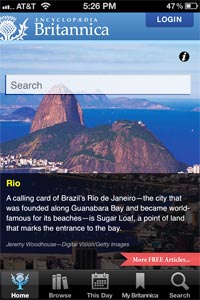 It was once an upper-middle-class status symbol like no other in the smartly accessorized home of the American 1940s, 50s and 60s. That long shelf of
dark-spined volumes from Encyclopedia Britannica spoke to your commitment to your children’s education, to serious thought, to even more serious conspicuous consumption.
It was once an upper-middle-class status symbol like no other in the smartly accessorized home of the American 1940s, 50s and 60s. That long shelf of
dark-spined volumes from Encyclopedia Britannica spoke to your commitment to your children’s education, to serious thought, to even more serious conspicuous consumption.
Do you know
how much those damned things cost? In my working/middle-class home, we got the World Book and were happy for that. In our neighborhood you went to a library or Richie Rich’s house if you
wanted to see what an Encyclopedia looked like.
Well, the Britannica is not quite the pricey emblem of high net worth the brand once was. It is hard to imagine a product so
thoroughly challenged and made obsolete by the Internet as a hard-copy encyclopedia. In fact, sometimes it is hard to tell if “Wikipedia” has a chortle to its name.
But
Encyclopedia Britannica saw this one coming many years ago and has been aggressively cultivating online models for its content for a decade at least. All of that incredible research and exhaustive
material from experts in their field continues to sniff at the likes of Google and Wikipedia, but EB.com surely has embraced the power of digital distribution and access. And now the full contents
of the encyclopedia, all 80,000 articles, is available for a mere $1.99 a month on the iPhone.
The Encyclopedia Britannica App is now available for the iPhone and iPod Touch. It is a free
download and gives the non-paying user free access to 100 articles and the first 100 words of anything thereafter. The $1.99 a month adds full content access and the ability to download content for
offline reading, saving and sending articles, a search history, etc.
The interface is excellent. A Bing-like search box is the main point of entry, but there are also tools for
browsing from a number of different directions. You can tell that these folks have been cracking the nut of wrangling massive amounts of content into a usable interface. The main reading
screen is kept large and uncluttered, with tools that slide in as needed and the most likely features always kept at hand.
The app is designed for both the task-directed researcher and the
data dog who just likes digging. The results of a search gives you descriptive and helpful one-liners that telegraph where the next click will lead. Try this stuff with Google.
Even
better, Britannica learned long ago to drop any Anglophile and stuffy affectations. It has fun facts all over the place, a daily calendar of historical events, and artful animations for most
operations that keep the whole experience pleasant and engaging.
And check out the LinkMap, an incredible visual explosion of your topic into a web of related subjects you can explore or
themselves explode into ever more tentacles of related knowledge. While a bit cramped on an iPhone screen, the functionality and visual presentation is just stunning. A more expansive iPad version
of this app was issued six weeks ago, and it makes the map more manageable. But even at this scale it works.
In a Google-ized age of algorithmic discovery and crowd-sourced truths, it
is good to have an Encyclopedia Britannica still here. It reminds us foremost that expertise matters. Social networks are nice, but the fact remains some people really are “authorities”
worth listening to first if you want to learn the most in a relatively impartial way. More to the point, digital media and a valley full of startups didn’t invent “information
architecture.” When you have tens of thousands of articles spanning a score of volumes that can wrench an arm, you spend a few generations thinking hard about things like usability.